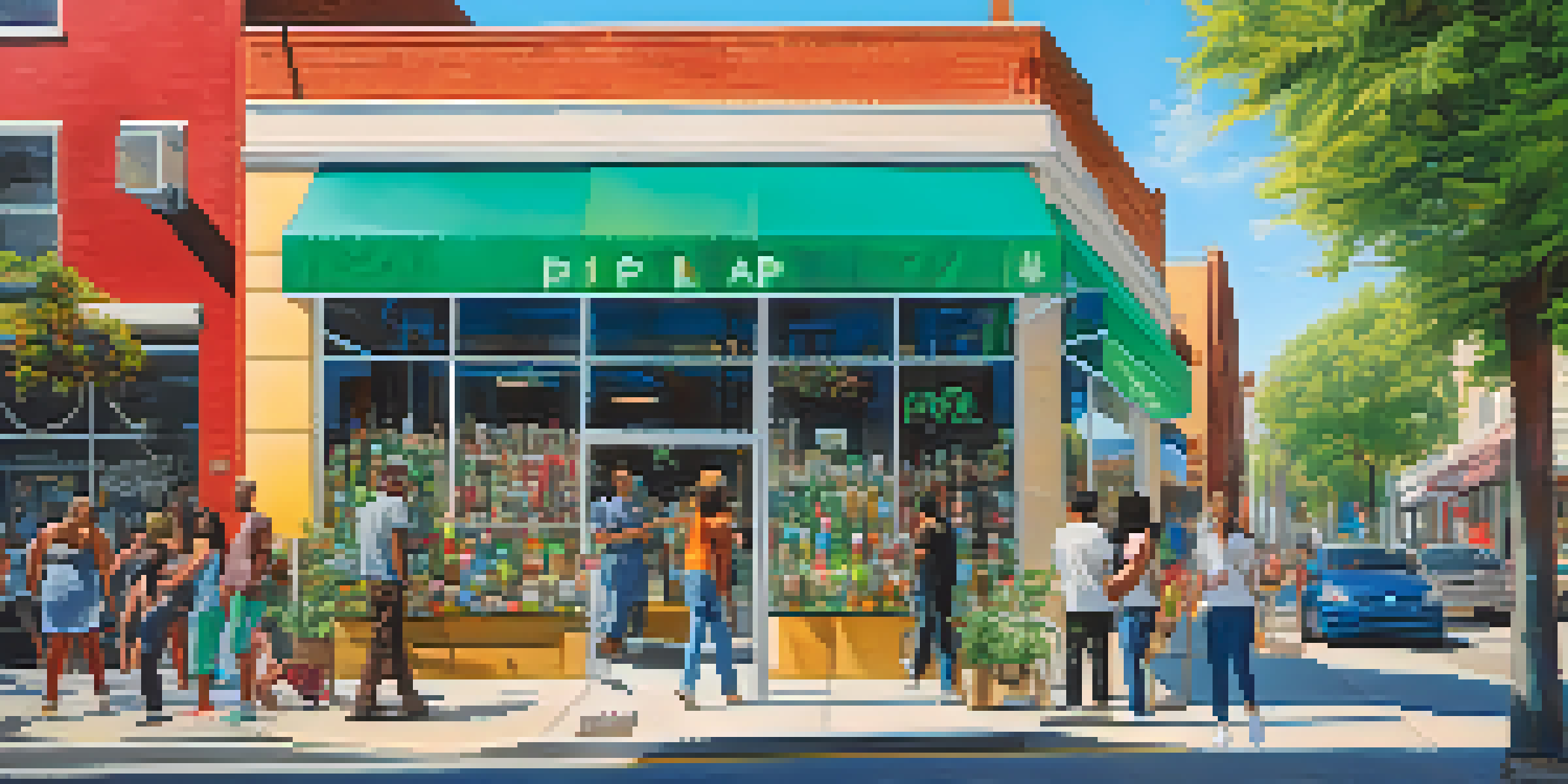Marijuana Dispensaries: A Catalyst for Urban Development

The Rise of Marijuana Legalization and Its Impact
In recent years, the legalization of marijuana has gained momentum across various states, leading to a surge in dispensaries. This shift not only reflects changing societal attitudes but also presents unique opportunities for urban development. As cities adapt to this new reality, dispensaries are often at the forefront of economic revitalization.
The legalization of marijuana has the potential to significantly boost local economies and create jobs, transforming communities in the process.
The presence of legal marijuana businesses can stimulate local economies by creating jobs, increasing tax revenues, and attracting tourism. For example, Denver saw a significant influx of visitors drawn by its vibrant cannabis culture, which has benefited surrounding businesses. This economic impact is prompting cities to rethink zoning laws and urban planning strategies to accommodate dispensaries.
Moreover, marijuana dispensaries often invest in their communities, sponsoring local events or supporting neighborhood initiatives. This community engagement can foster a sense of belonging and pride, transforming dispensaries from mere retail outlets into respected community pillars. As cities embrace this new industry, the potential for urban development grows exponentially.
Creating Jobs and Economic Opportunities
Marijuana dispensaries are not just about selling products; they are engines of job creation. From budtenders to marketing specialists, the cannabis industry offers a diverse array of employment opportunities. In fact, the legal cannabis sector has generated thousands of jobs nationwide, significantly reducing unemployment rates in some urban areas.

These jobs often provide competitive wages and benefits, contributing to a more robust local economy. For example, in California, the cannabis industry has created over 50,000 jobs, many of which are in areas that previously struggled with high unemployment. This economic boost can lead to a ripple effect, as more jobs mean more disposable income circulating within the community.
Economic Boost from Dispensaries
Legal marijuana businesses create jobs, increase tax revenues, and stimulate local economies.
Furthermore, dispensaries often require local services, such as security, maintenance, and marketing, thereby supporting other local businesses. This interconnectedness fosters an ecosystem where economic growth is shared, leading to sustainable urban development. As more cities recognize this potential, the role of dispensaries in job creation will only expand.
Enhancing Urban Spaces with Dispensaries
Marijuana dispensaries are often designed with aesthetics in mind, contributing positively to their urban environments. Many dispensaries prioritize modern architecture and inviting interiors, transforming previously neglected storefronts into vibrant spaces. This beautification can enhance the overall appeal of neighborhoods, making them more attractive to residents and visitors alike.
Marijuana dispensaries can serve as community hubs, fostering engagement and contributing to a sense of belonging among residents.
Additionally, dispensaries frequently incorporate sustainable practices, such as eco-friendly materials and energy-efficient systems. This commitment to sustainability can set a precedent for other local businesses, encouraging a more environmentally conscious approach to urban development. As communities strive for greener futures, dispensaries can lead the way in adopting innovative practices.
Moreover, the integration of dispensaries into urban landscapes can encourage pedestrian traffic, fostering a more dynamic street life. This increase in foot traffic benefits not only the dispensaries but also nearby shops and restaurants, creating a vibrant community atmosphere. As cities evolve, the role of dispensaries in enhancing urban spaces becomes increasingly significant.
Regulatory Frameworks and Urban Planning
The legalization of marijuana has prompted cities to adapt their regulatory frameworks and urban planning strategies. Zoning laws must evolve to accommodate dispensaries while balancing community concerns and public safety. This often involves extensive stakeholder engagement to create guidelines that benefit both businesses and residents.
Successful integration of dispensaries into urban planning can lead to well-designed spaces that promote accessibility and safety. For instance, cities can designate specific zones for dispensaries, ensuring they are situated away from schools and parks while remaining easily accessible. This thoughtful planning can alleviate concerns while maximizing the economic benefits.
Community Engagement is Key
Dispensaries often foster community ties through events, education, and support for local initiatives.
As municipalities learn from early adopters, best practices in regulation and urban planning are emerging. This collaborative approach can pave the way for a more inclusive and prosperous urban landscape, where dispensaries function harmoniously within the community. The ongoing evolution of these frameworks will be crucial to the future of urban development.
Fostering Community Engagement and Support
Marijuana dispensaries often prioritize community engagement, seeking to build strong relationships with local residents. Many dispensaries host events, educational workshops, and health fairs that provide valuable information about cannabis and its benefits. This commitment to education helps demystify marijuana and fosters a sense of trust within the community.
Additionally, dispensaries frequently support local charities and initiatives, contributing to causes that resonate with residents. This philanthropic approach not only strengthens community ties but also enhances the dispensary's reputation as a responsible business. By aligning their goals with the community's needs, dispensaries can create a lasting positive impact.
As dispensaries become more integrated into the fabric of urban life, their role in fostering community support will continue to grow. By prioritizing engagement and collaboration, these businesses can help create a vibrant, inclusive urban environment where everyone benefits. Ultimately, the relationship between dispensaries and communities can serve as a model for responsible business practices.
Challenges and Controversies Surrounding Dispensaries
Despite the benefits, marijuana dispensaries also face challenges and controversies that must be addressed. Some residents express concerns about potential increases in crime or disruptions to neighborhood dynamics. These fears can lead to pushback against new dispensary applications, complicating their establishment in certain areas.
To mitigate these concerns, dispensaries can implement robust security measures and maintain open lines of communication with local law enforcement. Transparency and community involvement can help dispel myths and build trust, allowing dispensaries to demonstrate their commitment to public safety. By proactively addressing concerns, dispensaries can foster a more supportive atmosphere.
Urban Planning Adaptations Needed
Cities must evolve zoning laws and regulatory frameworks to successfully integrate dispensaries into urban landscapes.
Moreover, as the industry evolves, ongoing education about the benefits of regulated marijuana use is essential. Communities need to understand that legal dispensaries can contribute positively to public health and safety. By engaging in open dialogues and addressing concerns, dispensaries can work towards dispelling stigma and promoting understanding.
Case Studies of Successful Urban Development
Several cities have successfully integrated marijuana dispensaries into their urban landscapes, showcasing the potential for positive development. For instance, Portland, Oregon, has embraced cannabis culture, creating a thriving market that benefits the local economy. This approach has not only generated significant tax revenue but has also attracted tourism and boosted local businesses.
Another example is Toronto, Canada, where the city has strategically placed dispensaries in accessible locations while ensuring they are integrated into community planning efforts. This thoughtful placement has allowed for a balanced coexistence with residential areas, showcasing the potential for harmonious urban development. The city's experience highlights the importance of collaboration between dispensaries and municipal authorities.

These case studies provide valuable insights for other cities looking to harness the benefits of marijuana dispensaries. By analyzing successful models, municipalities can adopt best practices and tailor their strategies to fit their unique needs. As more cities explore this opportunity, the positive impact of dispensaries on urban development will continue to grow.
The Future of Marijuana Dispensaries in Urban Development
As marijuana legalization continues to spread, the future of dispensaries in urban development looks promising. Cities are starting to recognize the multifaceted benefits dispensaries bring, from economic growth to community engagement. This recognition is prompting more inclusive policies that support the integration of cannabis businesses into urban planning.
Moreover, the evolving cannabis industry is likely to lead to even more innovation in how dispensaries operate and engage with their communities. As consumer preferences shift and the market matures, dispensaries may pivot towards wellness and holistic approaches, further enhancing their role in urban development. This shift could redefine the landscape of retail spaces in cities.
Ultimately, the relationship between marijuana dispensaries and urban development is still unfolding. As cities adapt to the changing legal landscape and community attitudes, the potential for positive transformation remains significant. By embracing this evolution, communities can create vibrant, thriving urban environments that benefit everyone.